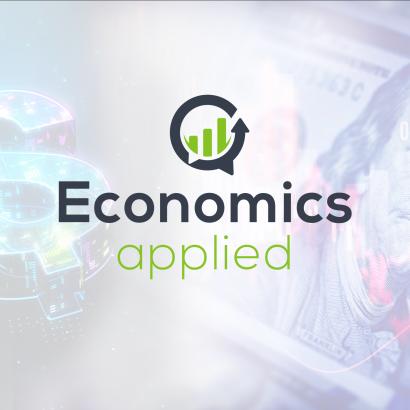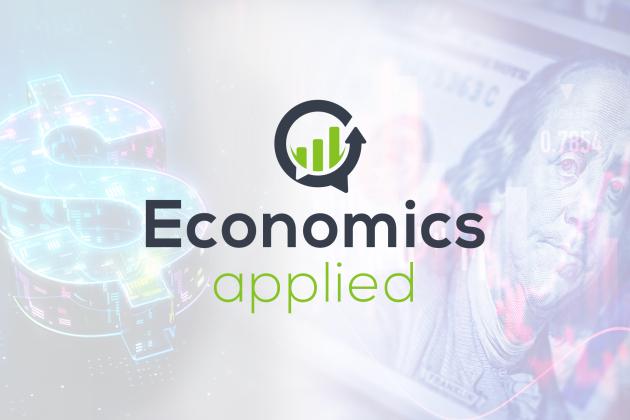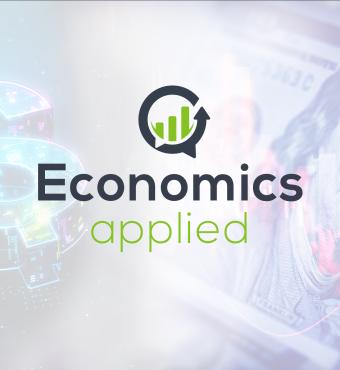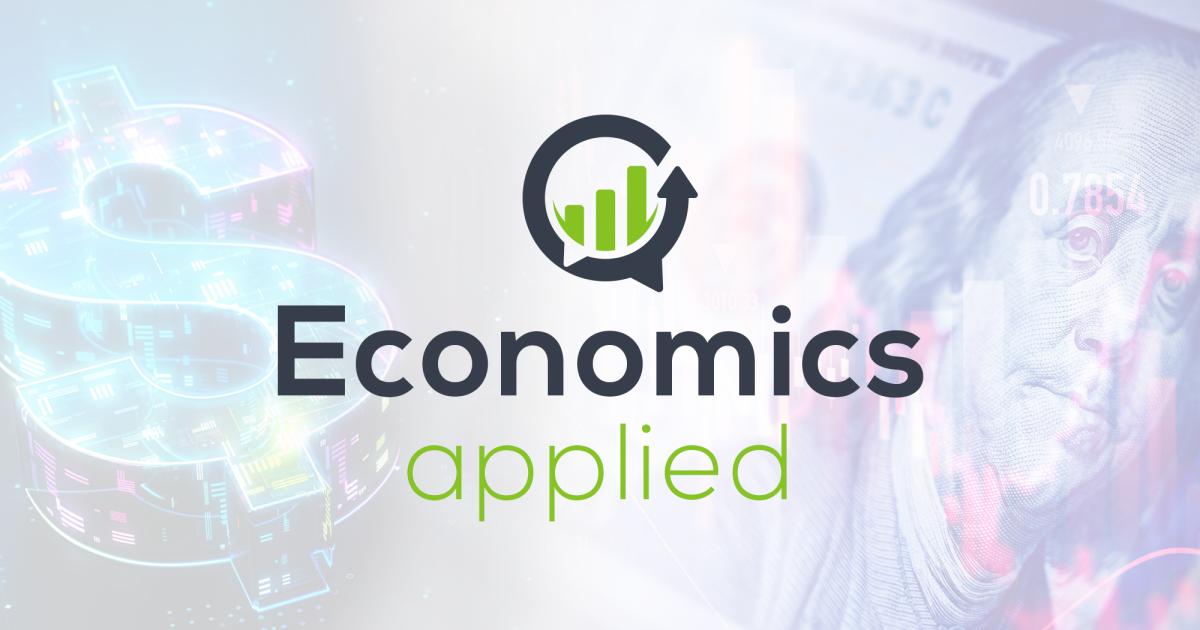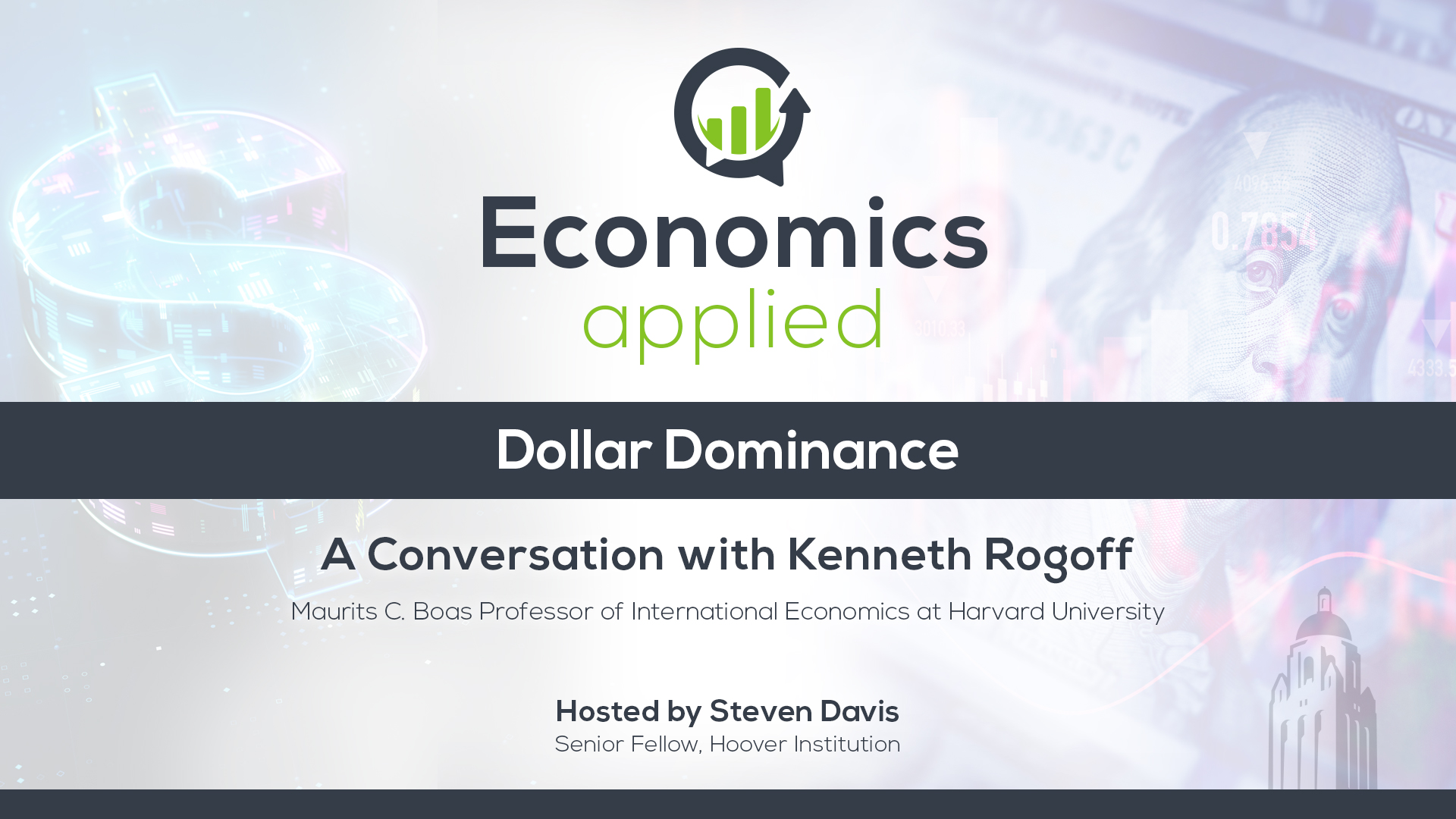- Economics
- Monetary Policy
- Trade
- International Affairs
- Answering Challenges to Advanced Economies
Steven Davis speaks with Kenneth Rogoff about the dominant role of the US Dollar in the international monetary and financial system, drawing on Ken’s new book, Our Dollar, Your Problem. They review how the Dollar became pre-eminent, the benefits and costs, the relationship to US monetary policy, and the forces that could undermine Dollar Dominance. These include geopolitical tensions between the US and China, the US fiscal outlook, and threats to central bank independence.
Recorded on June 2, 2025.
WATCH THE VIDEO
>> Steven J. Davis: The US Dollar dominates the international monetary and financial system. How does that dominance play out in today's economy? What are its benefits and costs? Is the era of dollar dominance coming to an end? And if so, will it fade out gracefully or end in crisis? Welcome to Economics Applied, a podcast sponsored by the Hoover Institution.
I'm Steven Davis, host of the show. Joining me today is Ken Rogoff, a world-renowned economist. Ken is a professor of International Economics at Harvard, former chief economist at the International Monetary Fund, chess grandmaster and author of many influential works, including his highly celebrated book with Carmen Reinhart, This Time is Different, Eight Centuries of Financial Folly.
Welcome, Ken. It's a real pleasure to have you on the show.
>> Kenneth Rogoff: No, thank you so much for having me. I already love the podcast because you have the word supply in the title. And I have to tell you, people ask me about is economics taught in a neutral way and it really does feel true.
You know, as time has gone on that more and more, if you look at the papers, if you look at teachings, the government's always the solution to the problem. And good to hear about the supply side sometimes.
>> Steven J. Davis: Yes, exactly, exactly. I think many of our guests over the life of this podcast do talk about the supply side issues.
And, and you're quite right, there's, there's an important role for the government to play, but it's not the solution to all problems and it's a mistake to think it is. So your latest book is what I want to talk about today. It's titled Our Dollar, your Problem, An Insider's View of seven Turbulent Decades of Global Finance and the Road Ahead.
The book, and I think this is characteristic of you and your writing generally and something I appreciate, it combines analytical clarity with a deep grounding in economic and financial history. And I mean that as a serious compliment. And on top of that, it's actually fun to read. So you weave a lot of your personal experiences into the book.
So tell us why you wrote the book and what you hope it will achieve.
>> Kenneth Rogoff: Well, I think I wrote the book because there's some things I really wanted to say. It's written to a broader audience, but I really wanted to say it to the profession and to sort of try to come back.
I feel that there's been important ideas that have been ignored, perspectives where having a longer term point of view is really important. So just a couple examples that only, you know, come later in the book are there. There was this view that real inflation adjusted interest rates, and I'm talking about the longer term ones, would be lower forever and I debated that with Larry Summers, with Paul Krugman, with Olivier Blanchard, and even some more colorful characters like Peter Thiel all around the world for years.
And they were convinced that the interest rate would just go like that with all kinds of implications for markets, but also for government debt, which seemed like a free lunch. And I said, you know, look at a longer horizon. The real interest rate is really volatile, it was low in the 30s until it wasn't.
Then it was high until it wasn't and why you would extrapolate this short period after the global financial crisis when real interest rates fell 300, 350 basis points at the 10 year end, inflation adjusted rates, why would you think that would last forever? And so there were, there were a variety of debates like that where I'd done a lot of professional work.
This wasn't something where I was writing op eds. I have a paper in the August 2024 AER, for example, and I'd also, there were other things I was writing about, like China, you know, how vulnerable was it to a housing crisis where again, I think I was way out of consensus and was working on it.
And the future of the dollar is one as well, so the things I wanted to say, I also took it as an opportunity to talk about the evolution of the international economics, which I think has changed a lot. But I felt it was important to give it a perspective first.
I know where it all came from, but I want the reader to know where it all came from 50 years ago, certainly 60 years ago, but 50 years ago we had no idea the Soviet Union wasn't going to do well. And you can go on and on in these things.
And so I tried to write it to bring this perspective historically, quantitatively, but then also wrap it in a certain number of personal anecdotes. It's not a memoir. Meetings with policymakers, world leaders, students that made a point, they're not thrown in there gratuitously to try to make it motivated and try to make it a little more entertaining to read.
So I hope people get there and really at the end I wanted to get these ideas out.
>> Steven J. Davis: Yeah. Okay, so I know the paper that you referenced in the air. It's a nice, it's a nice piece of work. And again, you know, it's several. That, that is another paper of yours that looks over several centuries to try to draw a broader, more historically informed perspective on major economic issues.
And in this case it was about what we could expect for the future path of the dollar. I take one of your central contributions in that domain is others to simply inject a note of caution that, look, the world's uncertain, even though we might have grown up, many macro economists, especially those who are a bit younger than you and me, grew up in the year of the great Moder.
That was what they knew, that informed their analyses and was built into many of the economic models in subtle ways. And looking at a longer historical perspective kind of injects a useful note of caution and prudence.
>> Kenneth Rogoff: Well, I think we both know this, Steve, that when you try to teach inflation, until recently, the students might listen respectfully, but they didn't care.
And I even asked one who worked as an RA at the European Central bank before coming a question about inflation, and she says to me, my generation doesn't think about inflation, it's not gonna happen. It's the 21st century. And we can pick a lot of examples like that where, you know, having a little more perspective, what goes around comes around, I think is important, Right?
>> Steven J. Davis: Well, yeah, the way I used to try to deal with that problem, the classroom is I often taught very international groups of students in executive MBA courses.
>> Kenneth Rogoff: And they'll speak up and tell inflation.
>> Steven J. Davis: Who is, who has had experience.
>> Kenneth Rogoff: Yeah.
>> Steven J. Davis: Almost always get at least one or two students who would go on at length about the miseries of a high inflation environment that they lived through.
So let's, let's get into the meat of your book and I want to ask you first, how did we get to where we are with respect to dollar dominance and also what are its main features? Because I don't think those features of dollar dominance are. Fully appreciated by even most professional economists.
So tell us how we got here and what does here really mean? What are the elements of dollar dominance that really matter?
>> Kenneth Rogoff: Well let me try to do real quick on the history which is the British pound was the dominant currency. The sun never sets on the British Empire, although it was actually never as widespread as the dollar is today.
The world wasn't as globalized, it wasn't as integrated. And there are other examples before that I go through in the book, the Dutch Flora and the Spanish Pieces of Eight. We had gotten to be bigger than the UK before World War I by almost any measure. I mean we didn't have GDP numbers back then as you know.
So this is historians calculations. But it certainly appears we had gotten much bigger than the UK but much like China is today, we were very inward looking at least in our banking. American bankers were making so much money in the US they weren't thinking about the rest of the world.
Well after World War I where we helped out a lot but we came in a lot later after a lot of destruction had been done and we lost a lot of. But the UK lost a lot more. So after World War I we were not only richer but the UK was a lot weaker.
And during that period I think the dollar moved co equal. I mean by all rights we should have been dominant at that point but we just, we weren't ready. And of course this takes us a little far afield, but not completely. I mean the Great Depression happened in part because we weren't ready for that leadership.
We didn't know how to use it. World War II, it's sort of the same thing in a way. We lost a lot more in World War II, but we again the UK lost a lot, lot more in World War II. Everyone was destroyed and again by economic historians measures because we still really didn't have universal GDP.
It just started in the U.S. we appear to be about 40% of the global economy after World War II. And we started an exchange rate system that we agreed upon meaning the United States dictated it pretty much to everybody. So called Bretton woods system that put the dollar on top.
So by construction we were the dominant currency. And how did that work? The other currencies had to peg to the dollar, they had to fix their exchange rates. They had a, a few minor realignments but basically they did that. We could do whatever we wanted. We but but although Franklin Roosevelt took us off the gold standard famously in the early 30s meaning individuals couldn't trade their dollars for gold if you had A dollar bill.
Back in 1920, it actually said payable in gold. And back then, $20 an ounce, and Franklin Roosevelt changed it to 35. But countries could still cash in their dollars for gold. After World War II, that was a pledge. The French sparked the end. You're jumping ahead. So the trouble with the system was that they were growing really fast and needed more and more dollars.
Just the way the Asian central banks have a lot of dollars today. They have trillions and trillions of dollars. The Europeans held the equivalent. They were growing really fast. They needed more and more dollars. And we were very good at providing them, but we didn't have more gold.
And so at some point, people are thinking, if we all tried to put our money in together, the US doesn't have enough gold. The system kept rolling anyway because it was working and nobody wanted to break things up, but you're absolutely right. The French were thinking, hmm, let's jump the queue and, you know, anticipate that we'd start getting gold out.
And they started taking out withdrawals and they're bigger and bigger. And it could have gone on for a while. And I think a lot of people thought it was going to last another decade. But at one point, Nixon said, game over. We're not doing it anymore. And he said, you can't trade your dollars for gold.
I mean, technically he suspended. And it took a while, but it really sparked, started in mid August 1971. So the rest of the world was furious, in part because the inflation in the US it started creeping up. And we wouldn't think it was terrible today, but you're getting into 3% and 3 and a half percent, and of course that's fine.
But if you're fixing the price of gold at $35 an ounce, it eats away at that over time. And so, Nixon sent his treasury secretary, John R Connolly, this colorful Texan, who, by the way, had been in JFK's John F Kennedy's car the day he was shot in Texas.
He had been governor of Texas. He got badly injured but had recovered. So he goes over to Rome to meet with his European and worldwide colleagues. And they said, what are we supposed to do with all these treasury bills? They don't actually hold dollars. They hold interest paying treasury bills.
What do we do with all these treasury bills now that you're inflating and we can't get dollars? And Connolly said some version of, well, it's our dollar, it's your problem. And by the way, that phrase speaks to me because it captures the arrogance of the US And I'm very, very, very proud to be an American, but don't like that edge of arrogance.
Also captures the irony that was our problem, because once we took away gold and weren't thinking about that at all, we just went to the races with printing money, and that led to the inflation of the 1970s. It also was a very weak period for the dollar, the European split off.
That was basically the main dollar club back then because the rest of the world really wasn't in the system.
>> Steven J. Davis: You are fleshing out the international dimensions of the 1970s inflation problem that remembered in the United States. And you pointed out how upset many U.S. trading partners and allies were with, with that episode.
Explained why. But the remarkable thing is that after the demise of the Bretton woods and the the link to the dollar, excuse me, the dollar link to gold was completely broken. Over the ensuing decades, the dollar emerged to be an even more central in the international financial system.
>> Kenneth Rogoff: Indeed. So we lost Europe. But what happened that maybe wasn't expected. The dollar's dominance fell after Nixon in the early 70s. That was not a period where the dollar was as powerful. But what happened was a lot of the rest of the world decided to globalize. So obviously China being the most important.
But India, Latin America, these countries which were sealed off by capital controls, they were very closed, suddenly were globalizing and the dollar colonized all of them. So we didn't have Europe, which is what we had after World War II. That was gone and we never got it back.
But we took a lot of the rest of the world and that's of course, Asia today is in many ways half of the dollar block. If you buy any measure of areas that are using dollars. So you asked what the advantages to us are. Well, numero uno is that we pay lower interest rates, not just Uncle Sam, everybody, mortgages, car loans, student loans, because dollars are held by the rest of the world.
I mean, just think of it and this, I know, crude for finance students. But the pool of demand was much bigger and you could pay, you could pay a lower interest rate. There are other advantages that people don't understand that, believe me, the rest of the world does.
But Americans, we don't think about it so much. One is that we gained control of the global financial system disproportionately to the size of trade, even, you know, the size of our economy. And we gained control partly because the dollar was on top and the US was important, but also because of our military power.
Now you hear Donald Trump use that all the time. If you don't use the dollar, we won't protect you. Believe me, Nixon was quite an sob and you can see that on the Watergate or another way of saying it's prepared to be really tough. You can be sure Lyndon Johnson, the president in the 60s was.
Ronald Reagan was. This has been going on a long time where we use all our leverage to control the system. What does it do for us? Well, the sanctions everybody knows about, we've been doing them to Russia. We're think doing them to 20 some countries right now. That's a big deal.
Okay. I'm skeptical of how great sanctions are. I think, I think they're a little bit like any medication you take for a long time, it wears off. But you're a little younger than me, Steve. I mean, my generation was getting drafted into Vietnam.
>> Steven J. Davis: Yes, I mean, I missed that, but you missed that.
>> Kenneth Rogoff: Believe me, it was a big thing to miss. I mean, I, when Nixon got elected, I was playing chess in Europe. I thought about not coming back. And there were. Now sanctions is not always what we do, but it's something. And our spying is, makes a lot of use of financial data.
Right. So it's a, it's a big advantage if we, if we lose some of this and we say no longer so dominant, these advantages can dissipate pretty quickly.
>> Steven J. Davis: Okay, So I just want to reiterate some of what you said and then add a few things and see if you agree.
So you stressed, you know, in terms of the advantages to the United States, lower funding costs and that that's a direct benefit to taxpayers because treasury securities get funded at lower cost than they would otherwise. But also, as you pointed out to everyday households, business People, it's cheaper to borrow in dollars than it is in other currencies, other things equal.
And that benefits anyone who wants to borrow in dollars. Okay. And related to that dollar, debt markets are just extraordinarily liquid compared to debt markets in most other currencies, which means you can get in and out of them easily, which is great if you need to borrow, but also great if you want to rebalance your portfolio.
So there are all these advantages. This shows up in terms of. I think you've implicitly already said this. Foreign exchange holdings of dollars, huge. Much of the world, especially Asia, which is a huge share of the global economy. Now, I guess a more subtle benefit that you didn't stress is if you are an American firm and you are trading abroad, you can often do all of your transactions invoiced in dollars.
So you don't need to worry about the currency risk that your counterparts might have to to the same extent. So there's a sense of. Which is just cheaper to operate in dollars if the dollar is your preferred currency anyway, in the sense that your costs are.
>> Kenneth Rogoff: Well, that's a really good, that's a really good point.
And I'm glad you added that. That's absolutely. Troy, I'm sure I say it in my book, but.
>> Steven J. Davis: You do. But I'm just kind of trying to lay out.
>> Kenneth Rogoff: No, no, there are many. That's a really good point. Like if, if you're, if, if you're at, you know, most countries, it's really problematic that the end thing they want is not necessarily dollars and they have to do all their trade in dollars.
And the exchange rate risk is a big, big problem.
>> Steven J. Davis: Right, right. And it's, it's been at the heart of some financial crises in recent decades. Maturity mismatch issues and balance sheets, which you do talk about at some length in your book. And then the other thing you specified is that the, it's worth reiterating that the dollar dominance gives the United States this extraordinary degree of control and oversight and monitoring ability of financial transactions around the world that can be used for spying purposes.
It can be used to impose sanctions, as it has been on the Russians and so on. So there's many elements to this dollar dominance. They involve many benefits to the United States. There's benefits to the world as a whole. Of course, there's network effects and, you know, being able to operate in common currency and for many purposes.
But we should also perhaps talk about the costs for the US and there are some, you Talk about them in the book. So what are the costs from just from the perspective of a U.S taxpayer or a U.S. business or what are the costs of this dollar dominance?
>> Kenneth Rogoff: Well, I think the most, the largest and clearest cost is you have to maintain a strong military. If you don't maintain, maintain a strong military, you're not going to be the dominant currency. Again, it's very subtle. It's not just that we can protect our borders, we can guarantee the safety of things in the US it gives us a lot of control over the system.
But that's very, very expensive. Now maybe we do it just as much anyway, but you can't have your cake and eat it too, the way the Europeans wish they did. There's another very subtle cost.
>> Steven J. Davis: Well, can I just be on that one, Ken, before you go? Because sure, military one is a bit subtle.
It may well be that military power in considerable measures a necessary condition for currency dominance. But it's far from obvious, at least to me, that if the United States lost currency dominance, then in the current environment, that would reduce the demands on its military. So in that sense, do you agree with that statement?
>> Kenneth Rogoff: I don't know. I mean, it's hard to sort of, you know, separate out the full picture because the doll allows us to fund the military more cheaply. And I mean, even though we don't think about the benefit all the time, it's actually a rather big one, you know, that we get from having the military.
So no, certainly you can't attribute the whole difference between 1% that Canada spends on its military and we've spent, we're spending 3% now. It's usually been much more. That's not all because of the dollar, but, but certainly some of it's are it's part of our global power of how we express.
So that's fair. So exactly what the cost is not, of course, if you had to have that much spending on the military, it's the dollar benefits alone wouldn't necessarily be worth it. I mean that. But, but at the margin they are. Another cost that some people emphasize is, is that in a recession, naturally if you're the safe asset, normally it means your currency appreciates, which sounds good, but actually in an interconnected world means the stuff you're holding abroad isn't.
An American you're losing money on. And the stuff in the United States, the currency appreciation, the foreigners are gaining money on. So Elaine Ray and Pierre Olivier Garrinchas have called this the exorbitant duty because normally it's a privilege. You're getting a lower interest rate, but you have to take it on the chin.
It's a little complex because that's not just about U.S. treasury holdings. It's about the whole kit and caboodle of different kinds of assets people hold. Now, given that we're having this conversation today in, you know, to 2025, we have to also mention the Trump administration's claim of what the cost is of holding the dollar.
So Steve Moran, who does have a Harvard PhD, very smart guy, the head of the Council of Economic Advisors, has this hugely publicized Mar A Lago accord that he wants. And it's without going into the history, it's named after a famous accord we had with Japan where we beat the crap out of them to make them appreciate their exchange rate.
It was a huge mistake of Japan to agree to it. Another thing, the Mar A Lago accord says we should do that writ large to everybody. The dollar's too high because we're the reserve currency and we should force it down. And a piece of it involves defaulting on all our debt to foreign official holders.
To be specific, we take their typically very short term treasury bills and give them 100 year discount bonds. So no interest till the end. I think we set the interest rate on it. But to make a long story short, Moran says it's so awful for us to be the reserve currency because it makes the dollar so high that we have to do this.
There's a grain of truth to it. I don't want to dump on it as just terrible. But first of all, the dollar goes up and down. It's high now, but 10 years ago was really low. And we were the reserve. We probably were more the reserve currency then China hadn't been peeling off than we are today.
In the 1960s and 70s, we were running surpluses. We were the reserve currency back then. The UK ran surpluses almost all the time when it was the reserve currency.
>> Steven J. Davis: Yeah, I'm at least as skeptical of Mehran's arguments in that respect as you are. I just mentioned two other things.
One, you've already pointed out the huge benefit that the United States enjoys as a consequence of its reserve currency status, that our funding costs are lower than they would be otherwise. That's a huge deal just from the perspective of the US taxpayer, US government debt outstanding, we owe $37 trillion.
$37 trillion. Even 50 basis points on real money. Yeah, a couple hundred, a couple hundred billion dollars.
>> Kenneth Rogoff: A hundred million dollars.
>> Steven J. Davis: So that's a lot. And the other thing about, you know, bond, when your currency is highly valued, that means the stuff you buy from abroad is cheap.
No, it's, it's, the first order effect is that's a good thing, not a bad thing.
>> Kenneth Rogoff: Well, all that's true, but beyond that there are so many things that first of all we don't understand exchange rates, very hard to predict. But there are a lot of things that in principle bid up the dollar.
We have oil, we're energy independent, we're, you know, you're in California, we have very good tech, I'm in Boston. We have very good biotech. You can go on and on. Our agriculture rules the world. So all of these things. And you know, the claim is that that's what made our manufacturing go away, which is obviously just wildly overstated.
>> Steven J. Davis: Right. So let me, I want to push ahead here. So there's another aspect of dollar dominance, or at least it's connected to it that we should talk about, which is the Fed. The Fed is the world's most influential impactful central bank by far. That has a lot to do with the dominance of the dollar because monetary policy actions taken by the Fed influence financial conditions throughout the dollar dominated system around the world.
So for good or ill, monetary policy decisions made, the Fed are affecting the rest of the world much more so than the other way around. And that is another kind of indirect advantage, or at least it seems to me of dollar dominance, that we really have the leading central bank in the world.
And they can conduct their monetary policy in a way that suits our economic and financial conditions. And countries on the receiving end of that and the rest of the world are often, they just have to deal with it because.
>> Kenneth Rogoff: No, absolutely. A lot of countries are, are very influenced by what dollar interest rates are because they borrow and their trade might be linked to dollars and the exchange rate.
And the Fed by law is not allowed to look at other countries. When I worked under Paul Volcker in the early 1980s and when he was raising interest rates, it destroyed Latin America. There's no question. That was half of what hit them. He caused a recession which lowered commodity prices, which was the other piece of it, and it was a disaster.
Well, he felt bad for them, I'm sure, but he wasn't allowed to think about it. And it certainly gets Other countries very mad that we're in this dollar ruled world where the Fed doesn't have to look at other countries. What's very important about the Fed in terms of our success is it's done a pretty good job since the 1970s.
We've transitioned to a world where the Fed is reasonably independent. And I think you know that I wrote the first paper on why it's good to have an independent central bank focusing on inflation. And by the way, had a terrible time getting it published because all the referees said, it's just a veil.
Like it's meaningless to have an independent institution. But maybe Trump will prove that in the end. But it worked for a long time.
>> Steven J. Davis: And there's lots of evidence to support that.
>> Kenneth Rogoff: And other countries have done it. It's been a great divide. I would say it's been one of the most successful macro innovations we've had post war.
But if the Fed's being successful is a big piece of why we have dollar dominance, the dollar's worth something. You're not terrified? If we had what happened under the end of the Biden administration happen routinely, believe me, the demand for dollars would be a lot less. We saw that in the 1970s.
Everybody, we had 14% inflation. Everyone was pulling away. So maintaining some kind of predictable inflation's terribly important. And I, I think, you know, one of the areas I'm concerned about going forward.
>> Steven J. Davis: Well, this links back to your earlier discussion about the demise of the Bretton Woods. So then that completed the severing of the dollar from some underlying commodity standard.
Okay, so at that point, the value of the dollar is. Well, it rests in a critical way on the confidence that people have in the United States and around the world that the United States will conduct sound, sensible monetary policy. And ultimately that means sound fiscal policy as well.
And if we lose that, then the dollar standard is going to be on it.
>> Kenneth Rogoff: I don't know, but end the dollar standard. But I think we're definitely at a moment where that's an issue. So I see the dollar fraying at the edges from China gradually breaking away.
Okay, it's network effects are great, but they don't want to be in our network on everything. They're willing to give up a lot of network effects. And the Europeans like it less than you think. I mean they would like to be able to do more things in the euro, but the biggest problems are at the center and I believe with our unsustainable budget deficit, and I don't 100% know it's unsustainable.
You know, artificial general intelligence may solve all our problems. They may get rid of us too, but they may at least solve all our debt problems along the way. It's possible. There you have some very smart colleagues in your economics department who think that interest rates are going to just get lower and lower and lower again.
The current periods in aberration, they might be right, but I'm very skeptical about that myself. And if they don't go back to zero this whole free lunch period. When Larry Summers wrote his secular stagnation period, he by the way, has changed his mind without quite noticing that back when we debated it several times and I said no one would be talking about it in 10 years, he did not agree with me.
That's on record. And Blanchard, of course, presidential address in 2019, he, he concluded we really shouldn't think about debt anymore. It's become meaningless. The economist quotes him as saying that. And that was. And it, he's more careful in his paper, but not, you know, super careful. It's like debt can go up a lot, I don't know how much, but a lot.
And anyway, if you believe that, then there's no problem. But myself, I'm at least willing to admit I'm pretty darn unsure about it coming to what you were saying at the beginning. I'm very unsure about that. Why would I want to bet the farm on that happening? Why would I want to conduct a fiscal policy that could put us in a position where we have another war, another major supply crisis, and we go to the bank to withdraw our money, Meaning we go want to borrow money from all over the world and suddenly there's more resistance because interest rates have gone up or debts much higher.
Nobody knows when that would occur, what would make it occur. But why do I want to bet everything on assuming it wouldn't no, I'm.
>> Steven J. Davis: I'm with you on that one. So let me, but let me. So what do you make of the unusual behavior of financial markets, including currency markets, in the wake of the April 2nd Liberation Day speech?
So, just so the audience knows, there was an very, There was a very unusual confluence of reactions. Stock market fell in the United States. That's not unusual in, in the wake of a spike of uncertainty. This was. Policy generated uncertainty, but at the same time, the dollar depreciated and yields on U.S. treasury securities rose, which is kind of the opposite of the normal pattern of what happens in the wake of a big spike in uncertainty, regardless of where it comes from.
So many people saw that as, I think, a vote against the dollar and against the confidence in the soundness of US Policy. Is that how you saw it?
>> Kenneth Rogoff: Absolutely. And it continues to this day. That correlation has broken down. I don't want to pretend that that correlation was perfect all the time, because I've written papers on this, just not that perfect.
But given the announcement and the date it happened, usually if people are, if interest rates are going up in the US it's sucking money in. But this was a case where money was coming out and that was pushing the interest rates up and the dollar down. You don't wanna overstate it.
It was one time. There's some correction, but I think there's definitely a loss of confidence in investing in the United States. I mentioned been going on, there was the deficit, but there's more than that going on today. And again, I'm guilty of teaching at Harvard, but I don't regard myself as having Trump derangement syndrome.
I, I was asked actually recently, are you scared speaking on, you know, TV or something and criticizing Trump? I actually thought I been more scared ever saying Trump did anything right when you teach, you know, at any, almost any American university. But I think in this case, no, we think, you know, I'm, I think, you know, that's true.
>> Steven J. Davis: Yes.
>> Kenneth Rogoff: I think in this, I think in this case, you know, he, he just has a wrong model of the world and he's obsessed with having tariffs. And I think the world has seen it as mismanagement. And the old Trump one was pragmatic and things would go wrong.
He'd try something, call it experimental, pull it back and try to find the right path. Nothing wrong with that. By the way, Franklin delavore Roosevelt, who's a, you know, progressive hero, he did so much of that in the 1930s. He made so many mistakes, but he got some big things right.
Well, what worried everybody was this was obviously a terrible idea. The markets were telling everybody this was a terrible idea and he wasn't retreating. And it made people ask, what else could be wrong? Could the big beautiful tax bill have a lot of bad things in it that he won't retreat from?
The answer is yes. Are there other things that he might do? And so I think it wasn't just about the terrorists, but a concern about pragmatism in the United States policy making for the foreseeable future.
>> Steven J. Davis: Yeah. And I would add to that a sense that the tariffs more than other things, but not just the tariffs, revealed, at least in the near term, a breakdown of the usual checks and balances, separation of power that constrained arbitrary actions by the executive authorities.
I mean, there's litigation proceeding now in the courts that argues that many, many of the tariff hikes, not all of them, were either unlawful and perhaps even contrary to the Constitution. And certainly when I talk to people outside the United States, they're very worried about that. It's not just the tariffs themselves, but they see this, what looks like a.
>> Kenneth Rogoff: Longer term breakdown of our institutions.
>> Steven J. Davis: Constitutional order that also to some extent indirectly underpins the dollar dominance, because it lends confidence in the system.
>> Kenneth Rogoff: Yeah, I mean, when you're a foreigner, let's say investing billions of dollars into another country or hundreds of millions of dollars, you hope you'll get treated at least as well as the locals.
You hope you won't be discriminated against. And the United States had a reputation, if you were from Italy and you bought an apartment in New York, you might get a non resident tax just like somebody from New Jersey. But that's it. You're not going to be discriminated against.
And I think they rightly worry about that. And by the way, I don't know if you've noticed the big beautiful tax. Bill, I don't know what'll end up. I want this podcast to last a long time, but it's certainly proposed to have a 20% foreign investment tax on select foreigners.
They're taxing immigrant. Anyone who has a green card and tries to do a wire transfer. I mean, these are things discriminating against foreigners. I can do a wire transfer as an American to Brazil, but if I have a green card, I have to pay a tax. What's that about?
So there are all these things which, you know, which have been underpinning why everyone wants to be in the US and of course, they're reconsidering it. And I don't, I'm afraid this isn't something that's just going to go away with Trump, for starters. He's pretty good at picking out things that are popular.
And then the Democrats get into office and they don't necessarily undo it. Biden didn't do undo, really, almost any of his tariffs. How do we know these things will be undone? And, you know, it's, I think the rest of the world's looking at us, and they're not just looking at Trump, but they're saying, you elected Trump.
Is this what you want? And so I do think this is something my, When I finished my book, which was before I knew who would win the election, I was very concerned about Harris, too. I was very concerned about US voters. I, you know, I, I felt that there was a real risk to the dollar's dominance becoming much less.
And the book explains why. I have to say, I showed it to some of my colleagues and people in financial, and they said, they said, you're nuts. You know, like you're just. I had a lot of facts, I think, that supported it, but, you know, they didn't agree.
Now I showed to people that, you were too optimistic. But, I mean, it's, I think you can get hysterical about it and you shouldn't, but this was a step down. This is never going away. What's happened already.
>> Steven J. Davis: Well, I share that view. And I've come to, I don't think it's just about Trump's policies per se.
It's, I think, the only way to get back to where the United States was even five or ten years ago with respect to the extent to which it was viewed as a trusted, reliable trading partner, a place to do business and so on, is some internal US Reforms that make it clear the rest of the world, it's not just about getting a different person in the presidency's office, but that we could just as well have a left wing populist.
>> Kenneth Rogoff: No, absolutely, absolutely.
>> Steven J. Davis: It could go. And so it's about the capacity of the United States policy making process to produce sensible rules based decision making that is then followed through. That's what's in doubt. And that's deeper than Trump.
>> Kenneth Rogoff: No, absolutely, one of the things the Democrats keep saying, and horrifies me, is they wanna get rid of the filibuster, and so that when they have slightly win the election, they can just do whatever they want, which there are no constraints.
I mean, I think that would have been pretty disastrous too. So. No, it isn't all about Trump. I think I agree with you about the need for internal reforms, term limits, changing how long people in the House serve, changing how you do elections. I don't know. I, you have great political science colleagues and I do too.
But, yeah, I agree. It's, it's something much more fundamental and, and indeed all the people who just say it's all Trump, they're missing that. I mean, again, my book was sort of calling for this. I didn't know Trump would win and I didn't know Trump 2 would be so different than Trump 1.
I don't think I knew that.
>> Steven J. Davis: Yeah, that has been an unpleasant surprise on top of, for many of the unpleasant surprise that he won again. So look, we, we've already talked about some of it, but I just want to go back to this question. So here's how I read your book as saying the following.
As you point out, you wrote it before we knew the election, before we knew what Trump too would be like. Your book is pointing out there were already important forces that were potentially eroding the dollar. The dominance of the dollar didn't mean that we, I don't think you were predicting that the dollar standard was going to end anytime soon, but that there were forces pushing.
>> Kenneth Rogoff: But our interest rates would go up because it would be less. Our ability to impose sanctions would go down, our information control would go down and we wouldn't like it.
>> Steven J. Davis: We wouldn't like it. And that was the situation before Trump II. Trump II, I think has accelerated that.
>> Kenneth Rogoff: Exactly.
>> Steven J. Davis: My assessment, and yours too, your more informed assessment. But how do you see things going forward? I posed this provocative question at the outset. Might the dollar dominance fade out gradually or will it end in crisis?
>> Kenneth Rogoff: Well, I do think we'll have a crisis, but I don't think it will end dollar dominance.
The network effects are just too strong. To just have it go away overnight and the euro can fill some space. China is working on it, but the dollar is not going to disappear. But I do think there'll be a debt cr. Say it's not of a we don't pay debt crisis.
Who knows, you know, in our world. But basically it would take. I'll come to what the forms it would take. But I think the voter is just not prepared to make compromises. And Donald Trump, who's pretty pragmatic and I don't think he's stupid about the fact that running 7% deficits for as far as the eye can see is not going to be liked by the bond market.
And if he just cut out a few campaign promises, it would go a long ways, at least temporarily, towards calming people down. The voter just won't take it. You just can't find senators, people in the House who are really prepared to try to constrain the deficit and losing the exorbitant privilege.
The rise in interest rates that we talked about earlier are all pushing that up. So I, I think, and I say in the book five to seven years and maybe I'd go four to five years. Having seen Trump too. We were. We are going to get a situation where interest rates are just going up and up.
We're hit by a shock. I don't know it will be, but I promise you will have one and either entering it or exiting it, we're going to run into a problem. The debt. A lot of people say debt doesn't matter, the level of debt doesn't matter, which is kind of a joke.
But one of the ways it matters is the more you owe. When the bond markets test you a little, it costs you a lot.
>> Steven J. Davis: Yes, that's right.
>> Kenneth Rogoff: And I see us as being vulnerable. Now. What form will it take? It depends on the shock, it depends on the reaction.
But I see sort of two likely ones. One is the Japan solution, where basically you force feed debt into every orifice of the financial sector, insurance companies, pension funds, in order to have a larger local demand. Europe's done this too, by the way. We can come to that.
And that works. It's a tax ultimately on savers. It's not good for growth. Japan didn't grow for a lot of reasons, but it fell from being the richest country besides the United States. And it depends whether you use PPP or market. Get value of whether it's richer but it was the richest country besides the United States and it's moved like to the bottom of the group now during this period, very, very slow growth, I think in the United States if we try something like that, and I don't rule this out from either a Harris type figure or a Trump, it's going to be a crash, but it's going to be terrible.
And the other is inflation.
>> Steven J. Davis: One thing on, on, on the financial repression route which, which distinguishes the U S situation from the former situation in Japan or even Europe is yes, we can, we can impose financial pressure within the United States and on u. S institutions. But, but as you point, if you've already pointed out, much of the dollar demand is coming from outside the United States.
That's much harder for us.
>> Kenneth Rogoff: We can't. Much harder. It's very well said.
>> Steven J. Davis: And we're going to lose that, that. That demand and we're going to be paying, so we can, it's a. Less strategy for us.
>> Kenneth Rogoff: I think you're quite right. That's very well put. So I think, I argue that inflation is the most likely outcome, which is not a permanent solution.
We just had an inflation that cut down our debt to GDP, 10, 12% depending on how you calculate it. Right. I mean, and it's a temporary solution, but I think that's pretty darn likely. We may have price controls, we may have capital controls, but that's where I see things ending.
I'd say it's more likely than not. I, I mean, again, artificial general intelligence may save us. Maybe interest rates will collapse. Real interest rates are very volatile. And I don't mean temporarily in a recession. Really.
>> Steven J. Davis: And yes, and when you say artificial general intelligence will save us, I think what you mean is it's going to power such a growth boom over the next 10, 20 years that we will essentially grow our way out of the debt problem.
>> Kenneth Rogoff: Right, right. It could, it could be, although that.
>> Steven J. Davis: Would be an extraordinary development. We're talking like extraordinary development.
>> Kenneth Rogoff: And, and it is, you know, there are all sorts of social problems because mostly it's going to cause unemployment. If we see ourselves getting richer, the budget deficit of 7% will become 12%.
I don't really know that it would solve things. But you know, of course, I don't know. I mean, but I do think it's the most likely outcome and it's going to, you know, further undermine the dollar even as People, People see it coming.
>> Steven J. Davis: Right. Just one last point which you've hinted at, but you make it effectively in the book.
And I think it's worth putting on the table that. And you have said a version of this already, which is so much of the dollar demand that arises outside the United States itself is from Asia. And while the renminbi is not in a position now or probably anytime in the near future to function as a full fledged international currency, it is the case that much of the Asian supply chain flows through China.
And to the extent that the Chinese succeed in moving a lot of invoicing and collateral security holdings from the dollar to the renminbi, because they don't want to be in our network, that will bring parts of economies in Asia in that direction and will ultimately reduce the demand for the dollar.
At least that's how I see it. Is that a big deal or a small deal?
>> Kenneth Rogoff: No, I mean, I think you were saying it exactly right, that it's more, that they're making it more flexible for now. So you don't need to hold as many dollars, you don't need to peg to the dollar as much, because when the renminbi was the same as the dollar, you just held dollars, of course, but now that it's more flexible, you're using the dollar less.
I wouldn't overstate, let me, I wouldn't understate how quickly China's moving to have a better financial system in order to be able to provide basic services in exchange. They're working very hard at that and a lot of countries hate the United States. It's not just Asia, it's not just Russia, African countries, Latin American countries.
They're going to be doing trading on Chinese rails before you can blink. And that's, that's moving along. I mean, of course, I don't know if you've covered this, but I mean, China probably intends to blockade Taiwan at some point. They know we're going to put in financial sanctions.
They know that they have to have their own way of doing business. Believe me, they're working on it. And the rest of the world doesn't want their trade relations with China to break down. So that's coming.
>> Steven J. Davis: That's coming. So, you know, I don't know if the rest of the world hates the United States.
That seems overstated to me. But there is, there is interesting survey evidence that net favorability ratings among ordinary people around the world.
>> Kenneth Rogoff: I didn't, I, no, I didn't say that. Well, so in my book, in the first Chapter I describe how everyone loves us, but they hate us.
And I think that's probably what's accurate. But they don't trust us any more than the Chinese. So, like, if somebody's going to be knowing everything about their financial transactions, and if it's Xi Jinping, fine. You know, like, they don't, they don't, they don't think that's any worse.
>> Steven J. Davis: Okay, I'm not sure I agree with that, but I wanted to make a more.
>> Kenneth Rogoff: Think of yourself as an African dictator taking bribes.
>> Steven J. Davis: Okay, an African dictator. Yes, got it.
>> Kenneth Rogoff: But that's what we're talking about in Latin America, Africa, parts of Asia. There's a lot of places that, where we're sort of holier than thou and the Chinese aren't. And they would just as soon have it be the Chinese.
>> Steven J. Davis: Yeah, but I wanted to make a more limited point, which I think, for which there's, I think, good, good evidence that in the, since January and really since February of this year, net favorability ratings towards the United States among ordinary people in countries around the world has plummeted.
Okay. And that is, much of it's traced to the trade policy in some countries, like Canada. It's also can be traced to things like Trump's rhetoric about making cat into the 51st state.
>> Kenneth Rogoff: Yeah, the 51st state.
>> Steven J. Davis: There has been an enormous loss, at least for the moment, in kind of soft power, goodwill.
>> Kenneth Rogoff: Absolutely.
>> Steven J. Davis: And I, I think that's, that's another thing that's important to not lose sight of, and it's unfortunate. It's, it's not really a, a necessary consequence of some of the policy objectives of the Trump administration. It's more the way the administration has gone about it and the rhetoric that surrounds it and the what seems like hostility towards friends and allies.
So I, that's. That, I think, is quite an unfortunate development.
>> Kenneth Rogoff: So we're not going to get any debate from here, I'm an unapologetic globalist.
>> Steven J. Davis: Right. So I don't know if we can end on a more upbeat note than that, but let me ask you, is it.
So, let me try to, Let me ask you, is it, is, is it possible for the United States to turn things around in the policy sphere, in the institutional reform sphere? And if it did, is there a plausible scenario in which the dollar remains the dominant currency for decades to come?
>> Kenneth Rogoff: Well, the first part of it's for sure, yes. And you sure know the famous saying attributed to Winston Churchill, that Americans always do the right thing after they've tried everything else. And we, we have a system that historically has really adjusted to its mistakes. And we had the political system, the whole constitutional system's been, you know, a marvel.
I don't know if it's going through. As you say, there's some fundamental changes we haven't need to make. I don't know. But it's absolutely possible that the dollar will reverse course. But I don't think that's the most likely scenario. I think the most likely scenario is Europe becomes more important, China becomes more important, we stay first, but it's a lot less fun than it was.
And then who's going to be on top in 50 years, if I had to bet the United States. But these things can move very precipitously.
>> Steven J. Davis: Okay. All right. So we'll leave it on that semi-hopeful note. Ken, it's been great chatting with you about this. Thanks for writing the book, thanks for appearing on the podcast.
And I know you're talking about these issues in other forums and settings as well, and that's great because I think they deserve.
>> Kenneth Rogoff: But your questions were really good. You made a lot of good points, Steve, and I'm going to absorb them into future commentary I made.
>> Steven J. Davis: So I would, I would, I would maybe pass your course.
No, I probably wouldn't.
>> Kenneth Rogoff: Well, I'm, I'm sure I wouldn't pass your course, but that's, I don't worry about that anymore.
>> Steven J. Davis: Yes, right, we're beyond that. Okay, thanks, Ken. It's been a pleasure. Take care.
>> Kenneth Rogoff: Thank you so much. Okay. So long.
ABOUT THE SPEAKERS
Kenneth Rogoff is a Professor of International Economics at Harvard, former Chief Economist at the International Monetary Fund, chess grandmaster, and author of many influential works, including his highly celebrated book with Carmen Reinhart, This Time Is Different: Eight Centuries of Financial Folly. He is an elected member of the National Academy of Sciences and the American Academy of Arts and Sciences.
Steven Davis is the Thomas W. and Susan B. Ford Senior Fellow and Director of Research at the Hoover Institution, and Senior Fellow at the Stanford Institute for Economic Policy Research (SIEPR). He is a research associate of the NBER, IZA research fellow, elected fellow of the Society of Labor Economists, and consultant to the Federal Reserve Bank of Atlanta. He co-founded the Economic Policy Uncertainty project, the U.S. Survey of Working Arrangements and Attitudes, the Global Survey of Working Arrangements, the Survey of Business Uncertainty, and the Stock Market Jumps project. He also co-organizes the Asian Monetary Policy Forum, held annually in Singapore. Before joining Hoover, Davis was on the faculty at the University of Chicago Booth School of Business, serving as both distinguished service professor and deputy dean of the faculty.
RELATED SOURCES
- Our Dollar, Your Problem: An Insider’s View of Seven Turbulent Decades of Global Finance, and the Road Ahead by Kenneth Rogoff, 2025
- This Time Is Different: Eight Centuries of Financial Folly by Carmen Reinhart and Kenneth Rogoff, 2009
- Foundations of International Macroeconomics by Maurice Obstfeld and Kenneth Rogoff, 1996
FOLLOW KEN ROGOFF
- Project Syndicate Columns
- Kenneth Rogoff on X: @krogoff








